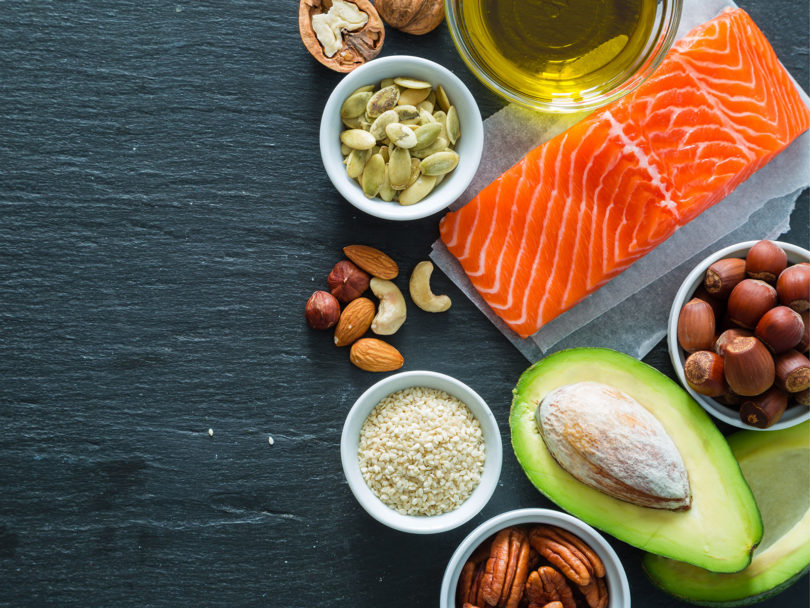In the 1980s, it wasn’t just acid-washed jeans that were all the rage: it was also low-fat diets. The government, physicians and magazines encouraged Americans to eat diets low in fat to stop heart disease, lose weight and stay healthy. The low-fat trend continued well into the 1990s and still affects how some Americans eat today.
But current diet trends don’t abide. Some of the most popular modern diets include the ketogenic diet and Paleolithic diet, both of which actually encourage high fat intake. Even new studies have started to show conflicting information on which fats are healthy and which are not.
So, how much fat should you eat? And can fat be good for you?
What does dietary fat do for your body?
Fat is not just an artery-clogging menace. Its effect on our bodies is much more complicated.
“Fats serve a variety of purposes,” says Caroline Fornshell, a registered dietitian-nutritionist and co-founder of LWell in Williamsburg. “Some act as a lube for certain things; others have anti-inflammatory purposes. Essentially, the fats you eat support certain functions of your metabolism.” Fats provide energy for your body to function appropriately. They can also act as a vehicle to help your body absorb nutrients such as vitamins A, D, E and K. Fats even affect the structure and function of individual cells, helping these cells absorb particles they need.
While too much fat can lead to weight gain and poor heart health, eating the right amount of fat is important for a healthy life.
How much fat should you eat a day?
How much fat you should eat each day largely depends on your individual health.
“There are some diets that are very high in fat that yield a positive outcome for the right person,” says Fornshell. “There are some diets that are low in fat that also yield a positive health outcome when prescribed correctly. There’s no certain [amount of ] grams or fat percentage that is right for everyone.”
Fornshell recommends that you don’t go to one extreme or the other when eating fat. “Everything in moderation,” she says. “You don’t want to overdo it. Before doing an extreme approach, reach out to a doctor or dietitian and get more direction. Follow a moderate diet plan and watch the calories.”
Fornshell says some diets, like the DASH (dietary approach to stop hypertension) diet, recommend only 20 to 25 percent of your daily calories come from fats. Other diets, like the ketogenic diet, recommend 60 percent or more of your daily calories come from fat.
She suggests most people start with the Mediterranean diet, a moderate diet where about 35 percent of your daily caloric intake comes from fats. The Mediterranean diet has good health outcomes in multiple studies, even if it doesn’t cause weight loss.
What type of fats should you eat — or avoid?
When it comes to choosing what types of fat to eat, there are few clear answers.
“Don’t limit yourself to thinking all fats are good or bad,” says Fornshell. “Most fats are a mixture of several different types of fats.” Fornshell says the one fat to make sure to avoid is trans fats. “Trans fats are manufactured fat,” Fornshell says. “They rear their ugly heads in things that sit on the shelf.”
Even if a trans fat is not listed on a food label, they may still be an ingredient in many foods. Trans fats may be listed as “hydrogenated oils” or “shortening” on ingredients lists.
Other types of fats, such as saturated fat, have conflicting health outcomes. Saturated fats are found in animal products like whole or 2 percent milk, butter, fatty meats and poultry skin. Even coconut oil can contain saturated fat.
Some saturated fats have positive effects while others harm your health. Most studies agree that saturated fats in moderation are not harmful to your health. These fats appear in foods like avocados, fish, nuts and seeds. Recent studies even suggest that replacing some carbohydrates in the diet with these healthy fats can lead to better cholesterol. However, if you have high blood pressure, high cholesterol or you are obese, you may want to limit how many saturated fats you eat.
Fornshell stresses to her clients that nutrition is complex. It’s not just about what fats you eat, but how those fats interact with other nutrients like protein and carbohydrates. The health effects of a diet can also vary from person to person.
“Fat can be individualized to get the health outcome you are looking for,” Fornshell says. “If you are concerned about your fat intake, you should ask your doctor about lab tests before starting a diet.”







